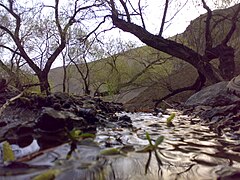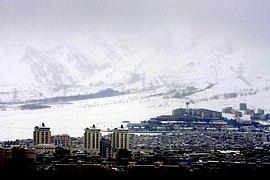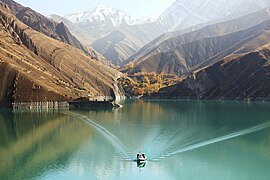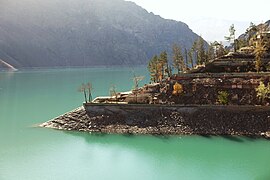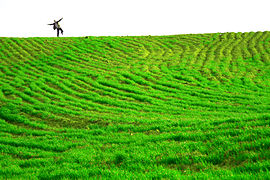Karaj: Difference between revisions
add photo |
|||
| Line 51: | Line 51: | ||
== History == |
== History == |
||
[[File:Shah-Abbasi Caravansaray, Karaj.jpg|thumb|left|Shah-Abbasi [[Caravansary]]]] |
[[File:Shah-Abbasi Caravansaray, Karaj.jpg|thumb|230px|left|Shah-Abbasi [[Caravansary]]]] |
||
Karaj has been hosting communities since 3000 years BC.<ref>L. van den Berghe, ''La nécropole de Khūrvīn'', Istanbul, Nederlands Historisch-Archaeologisch Instituut in het Nabije Oosten, 1964.</ref><ref name="iranica">[http://www.iranicaonline.org/articles/karaj-city-modern-city Karaj i. Modern City]</ref> The [[Khurvin|Khurvin region]] of Karaj has been inhabited since the [[Bronze Age]], and the [[Hemmatabad, Alborz|Kelak region]] on the left bank of [[Karaj River]] since the [[Iron Age]]. |
Karaj has been hosting communities since 3000 years BC.<ref>L. van den Berghe, ''La nécropole de Khūrvīn'', Istanbul, Nederlands Historisch-Archaeologisch Instituut in het Nabije Oosten, 1964.</ref><ref name="iranica">[http://www.iranicaonline.org/articles/karaj-city-modern-city Karaj i. Modern City]</ref> The [[Khurvin|Khurvin region]] of Karaj has been inhabited since the [[Bronze Age]], and the [[Hemmatabad, Alborz|Kelak region]] on the left bank of [[Karaj River]] since the [[Iron Age]]. |
||
| Line 59: | Line 59: | ||
Until the late 20th century, the city was mainly crossed into by a stone bridge built in the [[Safavid era]]. The stone built ''Shah-Abbasi [[Caravansary]]'', located at the southeast of Towhid Square, was built in the same era, under the rule of [[Shah Ismail|Šāh Esmāil]].<ref name="iranica"/> |
Until the late 20th century, the city was mainly crossed into by a stone bridge built in the [[Safavid era]]. The stone built ''Shah-Abbasi [[Caravansary]]'', located at the southeast of Towhid Square, was built in the same era, under the rule of [[Shah Ismail|Šāh Esmāil]].<ref name="iranica"/> |
||
| ⚫ | |||
In the 1810s, the Palace of Soleymaniye, which included four towers surrounded by gardens and walls, was built as a summer resort by the order of Shahzaden Soleyman (Soleyman Mirza), an old prince governor of [[Kermanshah|Kermānšāh]].<ref name="iranica"/> Granted in the [[Pahlavi era]] by [[Reza Shah Pahlavi|Rezā Šāh Pahlavi]], it is now housing the Faculty of Agriculture of the [[University of Tehran]]. |
In the 1810s, the Palace of Soleymaniye, which included four towers surrounded by gardens and walls, was built as a summer resort by the order of Shahzaden Soleyman (Soleyman Mirza), an old prince governor of [[Kermanshah|Kermānšāh]].<ref name="iranica"/> Granted in the [[Pahlavi era]] by [[Reza Shah Pahlavi|Rezā Šāh Pahlavi]], it is now housing the Faculty of Agriculture of the [[University of Tehran]]. |
||
| ⚫ | |||
The [[Morvarid Palace|Morvārid Palace]] was constructed in nearby [[Mehrshahr|Mehršahr]] district, during the [[Pahlavi era]]. It was designed by the ''[[Frank Lloyd Wright]] Foundation'' ([[Taliesin Associated Architects]]) on instructions from [[Shams Pahlavi]], elder sister of [[Mohammad Reza Pahlavi]]. Majority of the structure is now controlled by the [[Basij|Basij Organization]], and some sections of it are open to public under the operation of [[Cultural Heritage Organization of Iran]]. |
The [[Morvarid Palace|Morvārid Palace]] was constructed in nearby [[Mehrshahr|Mehršahr]] district, during the [[Pahlavi era]]. It was designed by the ''[[Frank Lloyd Wright]] Foundation'' ([[Taliesin Associated Architects]]) on instructions from [[Shams Pahlavi]], elder sister of [[Mohammad Reza Pahlavi]]. Majority of the structure is now controlled by the [[Basij|Basij Organization]], and some sections of it are open to public under the operation of [[Cultural Heritage Organization of Iran]]. |
||
| Line 66: | Line 67: | ||
== Geography == |
== Geography == |
||
[[ |
[[File:Mehrshahr view.jpg|250px|thumb|right|[[Mehrshahr|Mehršahr]], Karaj]] |
||
Karaj is situated {{convert|20|km|mi}} west of [[Tehran]], at the foothills of the [[Alborz]] mountains. |
Karaj is situated {{convert|20|km|mi}} west of [[Tehran]], at the foothills of the [[Alborz]] mountains. |
||
| Line 72: | Line 73: | ||
=== Regions === |
=== Regions === |
||
[[ |
[[file:karaj taleghani.jpg|250px|left|thumb|A view of Taleghani boulevard in Karaj]] |
||
The downtown of Karaj is usually referred to Karaj Square, located hundred of meters to the west of Karaj River and the old Karaj Bridge. The villages Hesārak, Gowhar Dašt, and Šahrak e Azimie are located in the northern Greater Karaj. |
The downtown of Karaj is usually referred to Karaj Square, located hundred of meters to the west of Karaj River and the old Karaj Bridge. The villages Hesārak, Gowhar Dašt, and Šahrak e Azimie are located in the northern Greater Karaj. |
||
Mehršahr, an abortive residential luxury resort, and Šahrak e Fardis, a popular modern quarter close to the industrial facilities,<ref>''[http://iranian.com/Kasraie/2004/June/Design/index.html Frank Lloyd Wright Foundation's deteriorating masterpiece in Iran]'', Nima Kasraie - June 4, 2004</ref> were designed by the ''Frank Lloyd Wright Foundation'' in the late 1960s. |
Mehršahr, an abortive residential luxury resort, and Šahrak e Fardis, a popular modern quarter close to the industrial facilities,<ref>''[http://iranian.com/Kasraie/2004/June/Design/index.html Frank Lloyd Wright Foundation's deteriorating masterpiece in Iran]'', Nima Kasraie - June 4, 2004</ref> were designed by the ''Frank Lloyd Wright Foundation'' in the late 1960s. |
||
| Line 112: | Line 113: | ||
|Sāsāni |
|Sāsāni |
||
|Homāyun Villā |
|Homāyun Villā |
||
|Asārā |
|||
|[[Mohamadshahr|Mehrānŝahr]] |
|[[Mohamadshahr|Mehrānŝahr]] |
||
|[[Mehdiabad, Savojbolagh|Mehdi Ābād]] |
|[[Mehdiabad, Savojbolagh|Mehdi Ābād]] |
||
| Line 305: | Line 305: | ||
== Transport == |
== Transport == |
||
{{see also|Transport in Iran}} |
{{see also|Transport in Iran}} |
||
[[File:Golshahr metRo.jpg|thumb|left|220px|[[Golshahr Metro Station]]]] |
|||
Karaj is connected by railway and highways to Tehran 40 km east and [[Qazvin]] 100 km northwest, and by commuter rail to [[Tehran Metro|the subway system of Tehran]]. |
Karaj is connected by railway and highways to Tehran 40 km east and [[Qazvin]] 100 km northwest, and by commuter rail to [[Tehran Metro|the subway system of Tehran]]. |
||
[[File:Golshahr metRo.jpg|thumb|right|220px|[[Golshahr Metro Station]]]] |
|||
The city is served by an urban railway organization established on 21 December 2001.<ref>{{Cite web |url=http://irtco.ir/en/pages/content.php?id=26 |title=Karaj Urban Railway History |access-date=2015-05-27 |archive-url=https://web.archive.org/web/20160304110146/http://irtco.ir/en/pages/content.php?id=26 |archive-date=2016-03-04 |dead-url=yes |df= }}</ref><ref>[http://www.irangulistan.com/cartes/train/iran-railways-map.jpg Iran Railways Map]</ref> It is also served by the [[Karaj Metro Station]] which was established on 7 March 1999, and is located in the south-eastern Karaj, near [[Freeway 2 (Iran)|Tehran-Qazvin Freeway]]. |
The city is served by an urban railway organization established on 21 December 2001.<ref>{{Cite web |url=http://irtco.ir/en/pages/content.php?id=26 |title=Karaj Urban Railway History |access-date=2015-05-27 |archive-url=https://web.archive.org/web/20160304110146/http://irtco.ir/en/pages/content.php?id=26 |archive-date=2016-03-04 |dead-url=yes |df= }}</ref><ref>[http://www.irangulistan.com/cartes/train/iran-railways-map.jpg Iran Railways Map]</ref> It is also served by the [[Karaj Metro Station]] which was established on 7 March 1999, and is located in the south-eastern Karaj, near [[Freeway 2 (Iran)|Tehran-Qazvin Freeway]]. |
||
| Line 347: | Line 347: | ||
== Sports == |
== Sports == |
||
{{see also|Sport in Iran}} |
{{see also|Sport in Iran}} |
||
[[File:Enghelab-Stadium.jpg|thumb|left| |
[[File:Enghelab-Stadium.jpg|thumb|left|200px|[[Enghelab Stadium (Karaj)|Karaj Enqhelab Stadium]]]] |
||
Karaj was formerly home of the [[Persian Gulf Pro League]] club, [[Saipa F.C.|Saipa]], for several years and this club won its first league championship in this city, however in 2014 the team relocated to Tehran. Currently the only professional football team in city is [[Oxin Alborz F.C.|Oxin Alborz]] that play in the [[Azadegan League]]. The Home stadium of Oxin Alborz F.C. is [[Enghelab Stadium (Karaj)|Enghelab Stadium]] that located in Karaj Enghelab sport complex and has a capacity of 15,000 people. |
Karaj was formerly home of the [[Persian Gulf Pro League]] club, [[Saipa F.C.|Saipa]], for several years and this club won its first league championship in this city, however in 2014 the team relocated to Tehran. Currently the only professional football team in city is [[Oxin Alborz F.C.|Oxin Alborz]] that play in the [[Azadegan League]]. The Home stadium of Oxin Alborz F.C. is [[Enghelab Stadium (Karaj)|Enghelab Stadium]] that located in Karaj Enghelab sport complex and has a capacity of 15,000 people. |
||
| Line 355: | Line 355: | ||
==Notable people== |
==Notable people== |
||
[[File:Ali Karimi of Iran wears symbolic green wrist bands before the 2010 FIFA World Cup Asian Qualifiers match between Iran and South Korea at Seoul World Cup Stadium.jpg|thumb|170px|Ali Karimi]] |
|||
[[File:Mehran Rajabi - 2006.JPG|thumb|170px|Mehran Rajabi]] |
|||
[[File:Taekwondo_at_the_2016_Summer_Olympics_women_Kimia_Alizadeh.jpg|thumb|170px|Kimia Alizadeh]] |
|||
* [[Mahmoud Bahmani]] (b. 1947), politician |
* [[Mahmoud Bahmani]] (b. 1947), politician |
||
* [[Shadi Amin]], political activist |
* [[Shadi Amin]], political activist |
||
Revision as of 13:45, 29 November 2018
Karaj
Karaj | |
|---|---|
City | |
| File:کرج.jpg | |
| Coordinates: 35°50′08″N 51°00′37″E / 35.83556°N 51.01028°E | |
| Country | |
| Province | Alborz |
| County | Karaj |
| Bakhsh | Central |
| Government | |
| • Mayor | Ali Nassiri |
| • City Council Chairman | Mohammad Nabiyoni |
| Area | |
• City | 162 km2 (63 sq mi) |
| Elevation | 1,312 m (4,304 ft) |
| Population (2016 Census) | |
| • Urban | 1,592,492 [1] |
| • Metro | 1,967,000 |
| • Population Rank in Iran | 4th |
| Time zone | UTC+3:30 (IRST) |
| • Summer (DST) | UTC+4:30 (IRDT) |
| Area code | 026 |
| Climate | BSk |
Karaj (Template:Lang-fa pronounced [kæˈɾædʒ] ⓘ) is the capital of Alborz Province, Iran, and effectively a suburb of Tehran. Although the county hosts a population around 1.97 million, as recorded in the 2016 census, most of the 1,419 sq km county is rugged mountain, the urban area is the fourth-largest in Iran, after Tehran, Mashhad, and Isfahan.[2] Eshtehard County and Fardis County were split off from Karaj county since the previous census.
The earliest records of Karaj date back to 30th century BC. The city was developed under the rule of the Safavid and Qajar dynasties, and is home to historical buildings and memorials from those eras. Until the second half of the 20th century, it used to be known mainly as a summer resort. Today, it is a major industrial city, with factories producing sugar, textiles, wire, and alcohol.
History

Karaj has been hosting communities since 3000 years BC.[3][4] The Khurvin region of Karaj has been inhabited since the Bronze Age, and the Kelak region on the left bank of Karaj River since the Iron Age.
The stone built Takht-e Rostam, located on a mount in the west of Shahriar County, was built in the Parthian era as a Zoroastrian fire temple.
Until the late 20th century, the city was mainly crossed into by a stone bridge built in the Safavid era. The stone built Shah-Abbasi Caravansary, located at the southeast of Towhid Square, was built in the same era, under the rule of Šāh Esmāil.[4]

In the 1810s, the Palace of Soleymaniye, which included four towers surrounded by gardens and walls, was built as a summer resort by the order of Shahzaden Soleyman (Soleyman Mirza), an old prince governor of Kermānšāh.[4] Granted in the Pahlavi era by Rezā Šāh Pahlavi, it is now housing the Faculty of Agriculture of the University of Tehran.
The Morvārid Palace was constructed in nearby Mehršahr district, during the Pahlavi era. It was designed by the Frank Lloyd Wright Foundation (Taliesin Associated Architects) on instructions from Shams Pahlavi, elder sister of Mohammad Reza Pahlavi. Majority of the structure is now controlled by the Basij Organization, and some sections of it are open to public under the operation of Cultural Heritage Organization of Iran.
Other historical sites of the city include the Mausoleum of Šāhzāde Soleymān, Emāmzāde Rahmān, Emāmzāde Zeyd, and Palang Ābād e Eštehārd.[5]
Geography
Karaj is situated 20 kilometres (12 mi) west of Tehran, at the foothills of the Alborz mountains.
Built on a wide plain with some gentle hills, the city is located north of the agricultural plain of Šahriār and east of the plains of Sāvoj Bolāq and Haštgerd.
Regions

The downtown of Karaj is usually referred to Karaj Square, located hundred of meters to the west of Karaj River and the old Karaj Bridge. The villages Hesārak, Gowhar Dašt, and Šahrak e Azimie are located in the northern Greater Karaj. Mehršahr, an abortive residential luxury resort, and Šahrak e Fardis, a popular modern quarter close to the industrial facilities,[6] were designed by the Frank Lloyd Wright Foundation in the late 1960s.
Meškin Dašt, a large agricultural area between Mehršahr and Fardis, lies outside the municipal limits of Karaj.
The following table includes the major districts of the city:
| Gouhar Daŝt | Mehrŝahr | Kiānmehr | Karaj e Now | Hesārak | Deraxti | Azimie | Ouj | Ŝāhin Villā | Bonyād | Bāqestān | Doulat Ābād |
| Garm Darre | Ŝahrake Jahānŝahr | Mesbāh | Mehr Villā | Dehqān Villā | Māhdaŝt | Ŝahrake Banafŝe | Fardis | Vahdat | Kalāk o Hesār | Estām Ābād | Golŝahr |
| Golŝahr Villā | Zibā Daŝt | Zoube Āhan | Sāsāni | Homāyun Villā | Mehrānŝahr | Mehdi Ābād | Ŝahrake Xātam | Miān Jādde | Heydar Ābād | Sāwoj Bolāq | Bahārestān |
Open space recreational areas of Karaj include Irānzamin Park, Pārk e Xānvāde, Tennis Park, Pārk e Mādar, Tāleqān Gardens, Kordān Gardens, Jahānšahr Gardens, Pardis e Golhā, and the Tulip Garden of Gačsār.
Climate
The climate of Karaj is a bit cooler than Tehran's, and it receives 260 mm of rain annually (and like Tehran, the precipation pattern is similar to those of mediterranean climates). The Köppen-Geiger climate classification system classifies the city's climate as cold semi-arid (BSk).[7]
| Climate data for Karaj (1985–2010) | |||||||||||||
|---|---|---|---|---|---|---|---|---|---|---|---|---|---|
| Month | Jan | Feb | Mar | Apr | May | Jun | Jul | Aug | Sep | Oct | Nov | Dec | Year |
| Record high °C (°F) | 18.2 (64.8) |
19.8 (67.6) |
27.4 (81.3) |
33.0 (91.4) |
34.6 (94.3) |
39.2 (102.6) |
42.0 (107.6) |
40.2 (104.4) |
37.2 (99.0) |
31.8 (89.2) |
25.0 (77.0) |
20.0 (68.0) |
42.0 (107.6) |
| Mean daily maximum °C (°F) | 6.1 (43.0) |
9.0 (48.2) |
14.2 (57.6) |
20.7 (69.3) |
26.2 (79.2) |
32.6 (90.7) |
35.2 (95.4) |
34.5 (94.1) |
30.4 (86.7) |
23.5 (74.3) |
15.1 (59.2) |
8.9 (48.0) |
21.4 (70.5) |
| Daily mean °C (°F) | 1.8 (35.2) |
4.1 (39.4) |
8.7 (47.7) |
14.5 (58.1) |
19.2 (66.6) |
24.6 (76.3) |
27.1 (80.8) |
26.8 (80.2) |
22.9 (73.2) |
17.1 (62.8) |
9.9 (49.8) |
4.6 (40.3) |
15.1 (59.2) |
| Mean daily minimum °C (°F) | −2.5 (27.5) |
−0.7 (30.7) |
3.2 (37.8) |
8.4 (47.1) |
12.2 (54.0) |
16.5 (61.7) |
19.0 (66.2) |
19.1 (66.4) |
15.3 (59.5) |
10.8 (51.4) |
4.8 (40.6) |
0.3 (32.5) |
8.9 (48.0) |
| Record low °C (°F) | −17.0 (1.4) |
−15.6 (3.9) |
−10.5 (13.1) |
−3.5 (25.7) |
−0.4 (31.3) |
7.2 (45.0) |
10.6 (51.1) |
12.0 (53.6) |
7.0 (44.6) |
−0.5 (31.1) |
−6.0 (21.2) |
−14.6 (5.7) |
−17.0 (1.4) |
| Average precipitation mm (inches) | 30.8 (1.21) |
32.1 (1.26) |
45.4 (1.79) |
39.1 (1.54) |
19.5 (0.77) |
2.7 (0.11) |
3.0 (0.12) |
1.2 (0.05) |
1.6 (0.06) |
15.1 (0.59) |
27.7 (1.09) |
33.5 (1.32) |
251.7 (9.91) |
| Average precipitation days (≥ 1.0 mm) | 6.3 | 5.7 | 6.7 | 5.8 | 3.7 | 1.0 | 0.7 | 0.3 | 0.3 | 3.2 | 4.8 | 5.8 | 44.3 |
| Average snowy days | 5.4 | 3.7 | 1.9 | 0.1 | 0.0 | 0.0 | 0.0 | 0.0 | 0.0 | 0.0 | 0.5 | 2.7 | 14.3 |
| Average relative humidity (%) | 67 | 60 | 53 | 48 | 43 | 34 | 35 | 34 | 36 | 44 | 56 | 66 | 48 |
| Mean monthly sunshine hours | 166.3 | 169.7 | 197.4 | 218.1 | 280.7 | 335.2 | 341.5 | 340.1 | 304.2 | 250.1 | 187.2 | 156.8 | 2,947.3 |
| Source: Iran Meteorological Organization (records),[8] (temperatures),[9] (precipitation),[10] (humidity),[11] (days with precipitation and snow),[12] (sunshine)[13] | |||||||||||||
Amir Kabir Dam and some other small lakes are based in Karaj. The city is a starting point for a drive along road forced north through the Alborz mountain to the Caspian Sea.[14]
-
Karaj Valley
-
Karaj in winter
-
Another view of the Karaj Dam
Demographics
The majority of the residents of Karaj are Persian-speaking people, with Azerbaijanis making up the second major ethno-linguistic group of the city. Kurds, Gilaks, Mazanders and Lurs include the other ethnicities among the population of Karaj.
Transport

Karaj is connected by railway and highways to Tehran 40 km east and Qazvin 100 km northwest, and by commuter rail to the subway system of Tehran.
The city is served by an urban railway organization established on 21 December 2001.[16][17] It is also served by the Karaj Metro Station which was established on 7 March 1999, and is located in the south-eastern Karaj, near Tehran-Qazvin Freeway.
The highway system of Karaj includes Tehran-Karaj Highway, Karaj Special Road, and the old road of Karaj (Fath Highway). Bākeri Expressway is one of the main north-to-south routes in west Tehran, which is connected to the Tehran-Karaj Highway.[18] Tehran-Karaj Highway is one of the busiest sections in Iran with AADT of 217084.[19] Karaj-Qazvin has an AADT of 79606.
The aerial transport of Karaj is served by the Payam International Airport, which was established in 1990, and was officially opened in 1997.
Economy
The economic base of Karaj is its proximity to Tehran. It is due to the transportation of products between Tehran and the Caspian Sea. Chemicals, fertilizers and processed agricultural goods are also produced in the city.
Karaj is a major industrial city, with factories producing sugar, textiles, wire, and alcohol. It has become a major area for middle class migrants from Tehran. This is due to the better environmental and cheaper housing conditions.
Zowb Āhan, the avenue leading to an industrial plant, is located at the south of Ostandar Square. Zowb e Āhan or Zowb Āhan, literally "steel mill", was a contract between the Pahlavi government and a consortium from Nazi Germany. The establishment of the factory Zowb Āhan e Karaj was halted by the beginning of the Second World War, and it was never launched.
Šahrak e Jahānšahr was the first modern private industrial and housing complex of Karaj, built in the 1960s. The factories Jahān Čit (textile factory), Rowqan Nabāti e Jahān (oil factory), and Čāy e Jahān (tea factory), were established at the complex. It is one of the largest industrial zones of the nation, with a 20% share of the national GDP.
The special economic zone of Payam, with an area about 3600 hectares within the territory of Payam International Airport, was established in Karaj for development of air cargo and postal transportation, cold store, and packing services, as well as perishable and time sensitive exports. It is the only SEZ in the region with the privilege of its own airline.
Education


Educational and research centers of the city include:
- Islamic Azad University of Karaj
- Kharazmi University
- Alborz university of medical sciences
- Faculty of Music of the Tehran University of Art
- Faculty of Architecture and Urbanism of the Tehran University of Art
- Faculty of Agriculture and Natural Resources of the University of Tehran
- University of Environment
- Payam e Noor University of Karaj
- Razi Vaccine and Serum Research Institute
- Center for Research in Agriculture and Nuclear Medicine of Karaj
- Material and Energy Research Center
Sports

Karaj was formerly home of the Persian Gulf Pro League club, Saipa, for several years and this club won its first league championship in this city, however in 2014 the team relocated to Tehran. Currently the only professional football team in city is Oxin Alborz that play in the Azadegan League. The Home stadium of Oxin Alborz F.C. is Enghelab Stadium that located in Karaj Enghelab sport complex and has a capacity of 15,000 people.
Karaj also has an international tennis complex which is used to training and tournaments.
One of the international ski resorts of Iran The, Dizin ski resort, is located a few kilometers north-east of the city, in the Alborz. In Dizin, along with skiing facilities, there are tennis courtyards, a slope for skiing on turf, some altitudes for mountain climbing and walking as well as riding and some routes for cycling.[20]
Notable people



- Mahmoud Bahmani (b. 1947), politician
- Shadi Amin, political activist
- Hossein Sanapour (b. 1960), writer
- Ahmad Sanjari (b. 1960), football coach
- Saied Reza Ameli (b. 1961), scholar of communication
- Mehran Rajabi (b. 1962), actor
- Fatemeh Ajorlou (b. 1966), politician
- Farshad Falahatzadeh (b. 1967), football player
- Mojtaba Taghavi (b. 1968), football player
- Naeim Saadavi (b. 1969), football player
- Leila Esfandyari (1970-2011), mountain climber
- Alireza Heidari (b. 1976), wrestler
- Ali Karimi (b. 1978), football player
- Ebrahim Sadeghi (b. 1979), football player
- Mohammad Nosrati (b. 1981), football player
- Rouhollah Dadashi (1982-2011), powerlifter
- Ebrahim Masoudi (b. 1982), futsal player
- Mehdi Mahdavi (b. 1984), volleyball player
- Ali Mohammadi (b. 1984), wrestler
- Saeed Kamali Dehghan (b. 1985), journalist
- Afshin Kazemi (b. 1986), futsal player
- Amin Manouchehri (b. 1986), football player
- Reza Mohammadi (b. 1986), football player
- Ali Kiaei (b. 1987), futsal player
- Mehrdad Pooladi (b. 1987), football player
- Milad Farahani (b. 1988), football player
- Fateme Ekhtesari(b. 1986), poet
- Kimia Alizade (b. 1998), Iranian first female and youngest Olympic medalist
See also
References
- ^ https://www.amar.org.ir/english
- ^ City Population: IRAN: Major Cities
- ^ L. van den Berghe, La nécropole de Khūrvīn, Istanbul, Nederlands Historisch-Archaeologisch Instituut in het Nabije Oosten, 1964.
- ^ a b c Karaj i. Modern City
- ^ Itto: Karaj
- ^ Frank Lloyd Wright Foundation's deteriorating masterpiece in Iran, Nima Kasraie - June 4, 2004
- ^ "Climate: Karaj - Climate graph, Temperature graph, Climate table". Climate-Data.org. Retrieved 9 September 2013.
- ^
- "Highest record temperature in Karaj by Month 1985–2010". Iran Meteorological Organization. Archived from the original on April 14, 2015. Retrieved April 7, 2015.
{{cite web}}: Unknown parameter|dead-url=ignored (|url-status=suggested) (help) - "Lowest record temperature in Karaj by Month 1985–2010". Iran Meteorological Organization. Archived from the original on April 14, 2015. Retrieved April 7, 2015.
{{cite web}}: Unknown parameter|dead-url=ignored (|url-status=suggested) (help)
- "Highest record temperature in Karaj by Month 1985–2010". Iran Meteorological Organization. Archived from the original on April 14, 2015. Retrieved April 7, 2015.
- ^
- "Average Maximum temperature in Karaj by Month 1985–2010". Iran Meteorological Organization. Archived from the original on April 14, 2015. Retrieved April 7, 2015.
{{cite web}}: Unknown parameter|dead-url=ignored (|url-status=suggested) (help) - "Average Mean Daily temperature in Karaj by Month 1985–2010". Iran Meteorological Organization. Archived from the original on April 14, 2015. Retrieved April 7, 2015.
{{cite web}}: Unknown parameter|dead-url=ignored (|url-status=suggested) (help) - "Average Minimum temperature in Karaj by Month 1985–2010". Iran Meteorological Organization. Archived from the original on April 14, 2015. Retrieved April 7, 2015.
{{cite web}}: Unknown parameter|dead-url=ignored (|url-status=suggested) (help)
- "Average Maximum temperature in Karaj by Month 1985–2010". Iran Meteorological Organization. Archived from the original on April 14, 2015. Retrieved April 7, 2015.
- ^
- "Monthly Total Precipitation in Karaj by Month 1985–2010". Iran Meteorological Organization. Archived from the original on March 30, 2015. Retrieved April 7, 2015.
{{cite web}}: Unknown parameter|dead-url=ignored (|url-status=suggested) (help)
- "Monthly Total Precipitation in Karaj by Month 1985–2010". Iran Meteorological Organization. Archived from the original on March 30, 2015. Retrieved April 7, 2015.
- ^
- "Average relative humidity in Karaj by Month 1985–2010". Iran Meteorological Organization. Archived from the original on April 14, 2015. Retrieved April 7, 2015.
{{cite web}}: Unknown parameter|dead-url=ignored (|url-status=suggested) (help)
- "Average relative humidity in Karaj by Month 1985–2010". Iran Meteorological Organization. Archived from the original on April 14, 2015. Retrieved April 7, 2015.
- ^
- "No. Of days with precipitation equal to or greater than 1 mm in Karaj by Month 1985–2010". Iran Meteorological Organization. Archived from the original on April 14, 2015. Retrieved April 7, 2015.
{{cite web}}: Unknown parameter|dead-url=ignored (|url-status=suggested) (help) - "No. of days with snow or sleet in Karaj by Month 1985–2010". Iran Meteorological Organization. Archived from the original on April 14, 2015. Retrieved April 7, 2015.
{{cite web}}: Unknown parameter|dead-url=ignored (|url-status=suggested) (help)
- "No. Of days with precipitation equal to or greater than 1 mm in Karaj by Month 1985–2010". Iran Meteorological Organization. Archived from the original on April 14, 2015. Retrieved April 7, 2015.
- ^
- "Monthly total sunshine hours in Karaj by Month 1985–2010". Iran Meteorological Organization. Archived from the original on April 14, 2015. Retrieved April 7, 2015.
{{cite web}}: Unknown parameter|dead-url=ignored (|url-status=suggested) (help)
- "Monthly total sunshine hours in Karaj by Month 1985–2010". Iran Meteorological Organization. Archived from the original on April 14, 2015. Retrieved April 7, 2015.
- ^ Iran. Ediz. Inglese by Andrew Burke, Mark Elliott, and Kamin Mohammadi, 2004
- ^ "Pars". Pars. Archived from the original on 2016-02-17. Retrieved 2016-02-12.
{{cite web}}: Unknown parameter|dead-url=ignored (|url-status=suggested) (help) - ^ "Karaj Urban Railway History". Archived from the original on 2016-03-04. Retrieved 2015-05-27.
{{cite web}}: Unknown parameter|dead-url=ignored (|url-status=suggested) (help) - ^ Iran Railways Map
- ^ Main Bridges on Tehran-Karaj Highway Commissioned
- ^ تردد بیش از یک میلیون خودرو از آزادراه تهران -کرج Archived 2013-08-12 at the Wayback Machine
- ^ ITTO: Dizin Ski Slope



